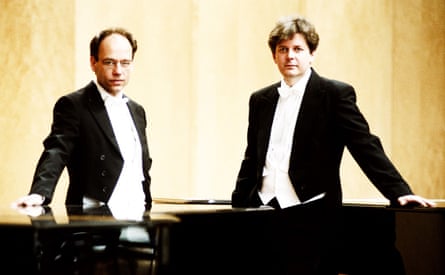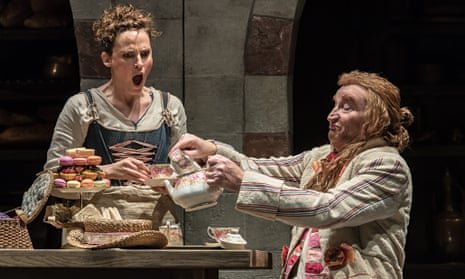Comic but not quite funny enough, full of glorious arias but cumbersome in its need for spoken dialogue, Mozart’s opera Die Entführung aus dem Serail (The Abduction from the Seraglio) always presents problems in the theatre. If anything it becomes ever harder for today’s audiences to swallow. Pivoting on a Christian-Ottoman conflict, the uneasy aspects poke away at you however much you push them aside as historical anachronisms. This youthful work was first performed in Vienna in 1782, when orientalism was a novelty, cultural stereotyping acceptable and the jingling and drumming of Janissary bands all part of the exotic mix. Knowing how to pitch it right in tone and mood today remains a hazard. It is also hard to cast. Done badly it can make you squirm.
Glyndebourne had an almost unqualified success with David McVicar’s beautiful if straitlaced production at this year’s summer festival. The main complaint was the excessive amount of spoken text. With the dialogue shortened, a promising cast and some crisp conducting by Christoph Altstaedt, Die Entführung now hits the road in a leaner form. It’s one of three works – with Donizetti’s Don Pasquale and Handel’s Saul – in this year’s Glyndebourne tour, which sets off from its Sussex home, visiting five venues and reaching an expected 45,000 people between now and December.
Designed by Vicki Mortimer with strong reference to the harem paintings of two English orientalists, John Frederick Lewis and David Roberts, the ochre colours and rich detail of costumes and interiors look handsome. Of the parallel pairs of lovers, the buffo characters come off best. Rebecca Nelsen’s bubbly, cartwheeling Blonde and James Kryshak’s capricious Pedrillo, rolling, tumbling, skittering, were well matched and entertaining. The Kansas-born tenor Ben Bliss sang elegantly and made what he could of the droopy Belmonte, a man of inaction if ever you saw one. The Hungarian soprano Ana Maria Labin was appealing but vocally tense in coloratura passages as his abducted lover Kostanze.
The seasoned British bass Clive Bayley, a skilled actor who can switch with ease from darkest villain (Bluebeard or Claggart) to big buffoon, handled Osmin judiciously: comical but not farcical, his ginger hair and beard nicely neutering his “terrible Turk” identity. With arias such as Konstanze’s Martern aller Arten, or the quartet Ach, Belmonte, Die Entführung has no shortage of musical riches. I still squirmed, but less than usual, for which much gratitude.
Wigmore Hall, justly celebrated as a venue for chamber music and song, is developing a secret alter ego as an essential place for contemporary music – secret only because too few people seem to realise these events are happening and audiences have been smaller than they deserve. The excellent Frankfurt-based Ensemble Modern participated in a day of concerts for Friedrich Cerha (born 1926) at the start of his 90th birthday celebrations. Little known here except as the man who completed the three-act version of Berg’s Lulu, the Austrian composer belongs to a European avant garde now fast receding into history. His Music for Trombone and String Quartet (2004-5) used the strings idiomatically and lyrically, while the solo instrument, virtuosically played by Uwe Dierksen, sang, boogied, teased and expostulated in endless variety. Eight tiny “Thought Splinters” for solo oboe, given their world premiere by Christian Hommel, were compact and rigorous, perhaps a little aloof expressively but always intriguing.
Not content with mounting new music concerts, Wigmore Hall has also entered the commissioning game. The GrauSchumacher Piano Duo from Berlin gave a spellbinding concert, which opened with Bach reinvented by György Kurtág elegantly and Busoni extravagantly (his mammoth Fantasia contrappuntistica). These works were played from memory, a feat in itself, with every line of counterpoint clearly voiced, every pianistic flourish and crossing of parts delivered with fantasy. The four hands of Andreas Grau and Götz Schumacher seemed to spring from one head and heart.

The evening’s high point was a European co-commission, with Wigmore among the sponsors, by the French composer Philippe Manoury (born 1952). For two pianos and live electronics, deftly realised by ExperimentalStudio des SWR and lasting nearly an hour, Le Temps, mode d’emploi (Time, Directions for Use) is in eight linked sections, though not so you would notice. Manoury names Stockhausen and Boulez as influences, and a concise programme note explained the piece in terms of structure, technique and Markov chains. In the event the piece was so aurally overwhelming, with the two live pianos being played with and against four “virtual pianos” relayed through speakers around the hall, that the best you could do was to concentrate on the sound itself.
Manoury’s other touchstone, the paintings of Jackson Pollock, is a help. At times the layers of sound roared around, as if the listener were being trampled by the four riders of the apocalypse or in the midst of a hailstorm. At other moments, the electronics chimed, crackled, gurgled, snapped, whispered, dissolved and caressed. A feast for the experiential completist, or even for the merely naive and curious.
Star ratings (out of 5)
Die Entführung aus dem Serail ***
Ensemble Modern ****
GrauSchumacher Piano Duo ****

Comments (…)
Sign in or create your Guardian account to join the discussion